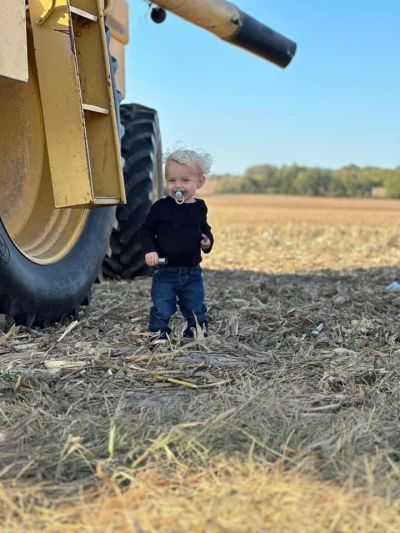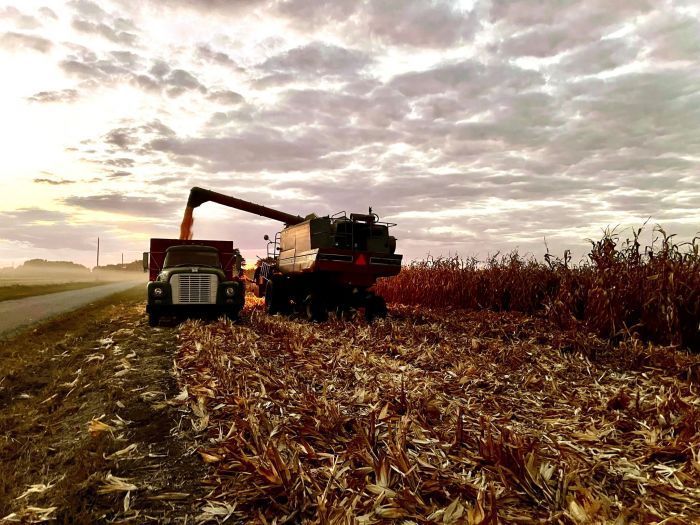Capturing Generations of Farm Life - Winners Revealed in the 2nd Annual End of the Year Photo Contest

Hear from Curtis Harms | 1st Place Winner:
The picture is of my son Archer who’s almost 2. Along with Archer, my wife Nikki and stepdaughter Brin we are the fourth generation on our farm near Red Bud IL. My wife is a Kindergarten teacher in Milstadt IL, and I work as Maintenance Manager for Lime Production Company along with operating our family farm with my parents. We recently completed the purchase of the farmhouse and building from my parent’s 4th ensuring Archer will be the 5th generation to grow up on the farm. I have been active in the family farm since 2017 and have been taking more of a lead every year as my dad transitions into retirement but grew up “helping” my dad and grandpa for as far back as I can remember. Prior to becoming involved in the farming operation I served 11.5 years in the US Navy.
This photo means a lot to me because it reminds me of what has been our farm’s definition of success since my dad was asked that question years ago. “Build a farm that the next generation will want to pass on to their children.” Archer won’t be two until March but this fall, he was already riding in the combine every chance he could, watching us work when he couldn’t ride along, and hopping right in and grabbing tools to run around with when I was making repairs (like this day when I had to replace a row unit drive on the corn head). Having a little one around to play with and see smiling on days when things aren’t going to plan makes harvest and planting far less stressful.
Hear from Amy Heberling | 2nd Place Winner:
My name is Amy Heberling from Morrisonville, IL in Christian County. I work for Prairie Farms Dairy Inc as a National Account Associate. I own a small diversified livestock operation and help with my family farm of row crops, hay production, and livestock operation. I do help on the farm, I like to say I am more of a livestock and hay person but help on the row crop when the help is needed.
I purchased my farm in the late summer of 202 but have been helping on the family operation for as long as I can remember with growing up on the farm and now live a mile from the home place.
I call this photo "The Legacy of Harvest ''. My dad and brother were harvesting corn one night when I got home from work and went to see if they needed any extra help. My brother Mathew grew up with our dad and grandpa harvesting in a combine just like this one and rode in the elevator in Palmer with dad in a grain truck similar to this one. While these aren't the exact equipment that he grew up with, it was the legacy our grandparents left with us from the farm.
I sometimes see something and something in my gut tells me to take a picture, and this was one of those evenings.


Hear from Mindy Messamore | 3rd Place Winner:
My name is Mindy Messamore. Born and raised in Bloomington but moved to Le Roy about 8 years ago. A year later I started dating the farmer down the road, Bobby Kline who has two wonderful children named Katie and Kody. I am a full-time caregiver and part-time office assistant for Bobby who manages Ed Kline Farms, LLC. I am also a part-time groundman for Bobby while he is working on the farm. The photo is of our first grandson, Rhett Lyle, who means the world to us. We think being grandparents is by far the best and he brings so much joy to our world; especially since he absolutely loves being with us on the farm and doing all the farm things. The picture was taken on the day our family processed sweet corn which is an annual tradition hosted by Bobby's parents, Ed and Vicki Kline. The family continues to grow, and it is very exciting to be a part of. Afterall, farming is family!
The winners of the 2nd annual end-of-the-year photo contest have been unveiled, showcasing the stories behind the camera. From the fields of Red Bud, IL, to the livestock farms of Morrisonville and the homesteads near LeRoy, these winning snapshots encapsulate the spirit of family, legacy, and the enduring connection to the land. Let's delve into the tales behind the lens as we celebrate the top three entries that artfully capture the essence of farming life in Illinois.







